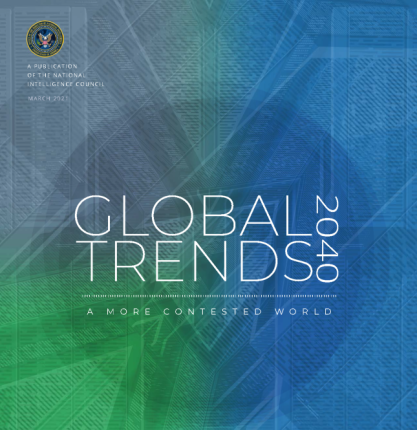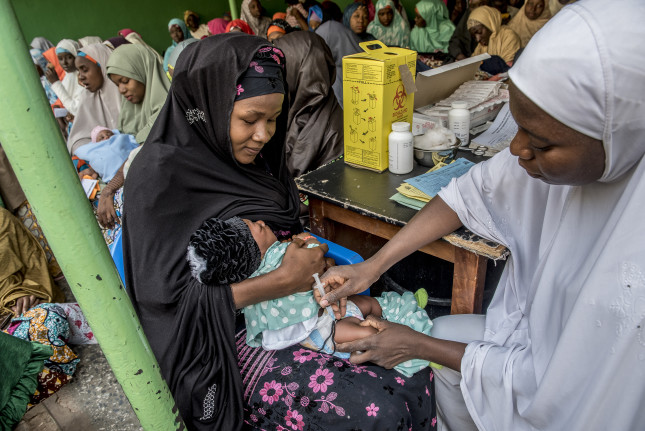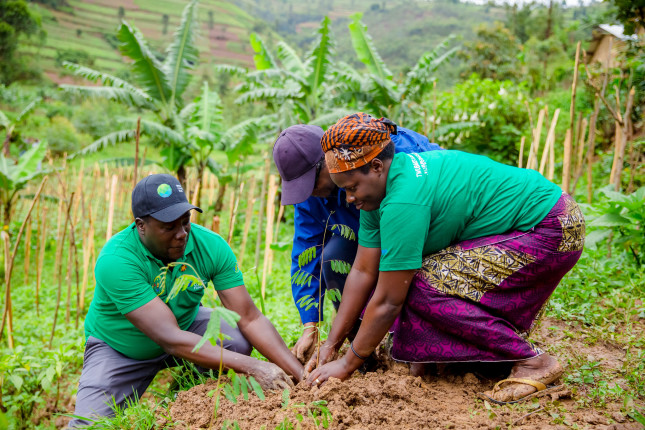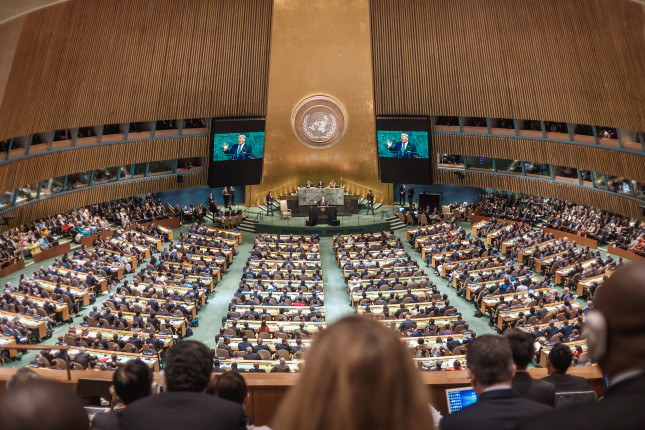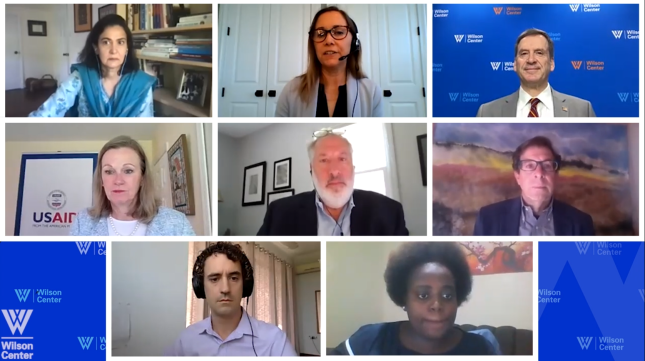-
A Conflict Prevention Agenda Should Inform Climate Change Actions in Africa
›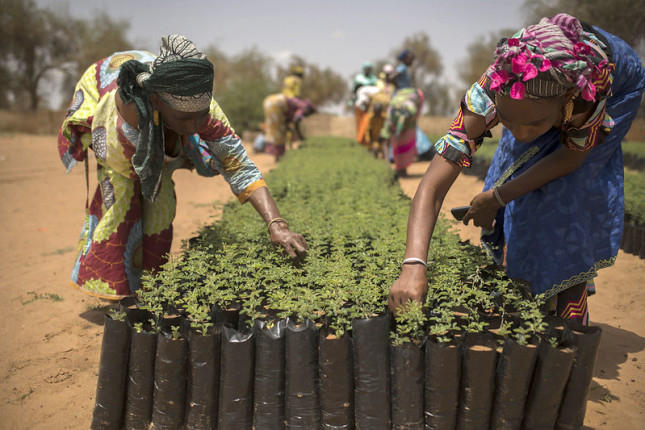
In Africa, climate change and population expansion are increasing fragilities and vulnerabilities—including contributing to conflict dynamics—for many people who directly depend on nature. To cope with how their environment can no longer supply livelihood needs, people are migrating in search of security or economic stability. These factors interact with one another in ways that underline the need for inclusive conflict mitigation considerations in climate change action.
-
The NIC’s Global Trends 2040 Report: A Development Outlook
›
The recently released National Intelligence Council’s Global Trends 2040 report, clocking in at over 140 pages, is titled “A More Contested World.” That headline should come as no surprise to development professionals. The report, reviewed by the incoming Director of National Intelligence Avril Haines, before being sent to President Biden and Congress, examines key trends that will likely influence U.S. national security out to 2040. I blogged on the Global Trends Report back in 2015, when it was on the verge of being unveiled at the splashy South-by-Southwest (SXSW) festival in Austin. This year’s public release was much more muted and the overall outlook decidedly more bleak, chaotic, and turbulent, not just from the lingering fallout of a “long tail” COVID-19 pandemic, but from the ominous environmental consequences of climate change on everything from glaciers and rising sea levels, to more frequent and intense tropical storms, and an unprecedented numbers of wildfires, like those seen last year in the Western United States. The NIC report also speaks to the ominous societal changes coming our way, best characterized by a widening chasm between what governments can reliably deliver and what citizens can reasonably expect.
-
Vaccines, Family Planning, and Freedom from Violence: Achieving Equity for All Women and Children
›
“From birth, from almost from cradle to grave, girls have been seen as some sort of baggage,” said Shamsa Suleiman, Project Management Specialist for Gender and Youth at the U.S. Agency for International Development (USAID), Tanzania. Suleiman spoke at a recent Wilson Center event with USAID MOMENTUM Country and Global Leadership about balancing power dynamics to achieve equity for all women and children in maternal, child, and adolescent health, and family planning. Home should be a safe space, said Suleiman. But for many girls, it no longer is. To escape the poverty and pressures at home, including early marriage and other forms of gender-based violence, some girls leave, said Suleiman. “Girls are trying to escape the safe spaces.”
-
Raising Ambition: The Role of the Green Climate Fund in Building Capacity and Catalyzing Investment
›
Coordinating international financing for climate adaptation and mitigation remains a persistent challenge. In its 2020 Adaptation Gap Report, the United Nations Environment Programme observes that the annual cost of climate adaptation in developing countries could rise from $70 billion today to $280-500 billion by 2050—and current funding levels are growing at too modest a pace to keep up.
-
A Conversation with Dr. Nahid Toubia: Bodily Autonomy and the 2021 State of World Population Report
›Africa in Transition // Dot-Mom // Friday Podcasts // May 28, 2021 // By Hannah Chosid & Deekshita Ramanarayanan Bodily autonomy is something almost innate in us, and yet also a Eureka moment for many people, says Dr. Nahid Toubia, Director for the Institute of Reproductive Health and Rights in Sudan on this week’s episode of Friday Podcasts. “Every human being really has the right to own their body, to own their decisions, to own their choices regarding their life, their futures, how they want to live, who they want to partner, whether they want to have children or not, what kind of families they want to have,” she says. “So, all of these choices are all wrapped up in this concept of body autonomy.”
Bodily autonomy is something almost innate in us, and yet also a Eureka moment for many people, says Dr. Nahid Toubia, Director for the Institute of Reproductive Health and Rights in Sudan on this week’s episode of Friday Podcasts. “Every human being really has the right to own their body, to own their decisions, to own their choices regarding their life, their futures, how they want to live, who they want to partner, whether they want to have children or not, what kind of families they want to have,” she says. “So, all of these choices are all wrapped up in this concept of body autonomy.” -
A Tale of Two Snails: Biodiversity Threats of Invasive Species in the United States and China
›Spring is the best time to eat snails, when they are their plumpest, sweet and rich in protein. Snails have been slurped in China for centuries and are an inexpensive treat for a holiday celebration. In contrast to French escargot, which is served with butter and garlic, the Chinese eat snails in stir-fry, braised or boiled and eaten right from the shell. Not all snails are a treat, however, and unfortunately some are extremely damaging to crops and natural ecosystems when they are introduced into a non-native environment.
-
Geoengineering and Notions of Sovereignty: A Wilson Center NOW Interview with Beth Chalecki
›
As climate change impacts become starker, interest in geoengineering is growing. Geoengineering is “climate manipulation technologies that we can use to alter the climate to offset the worst parts of climate change,” says Beth Chalecki, Associate Professor of International Relations at the University of Nebraska Omaha, and Research Fellow at the Wilson Center, in a recent episode of Wilson NOW. “It sounds like a technological fix, but of course it’s not that simple,” says Chalecki.
-
50 Years and Billions Spent: Achieving Universal Access to Water, Sanitation, and Hygiene (WASH) Within Reach
›
“Reporting on the progress made, the challenges that remain, and impact of COVID-19 on the WASH sector is crucial,” said Ambassador Mark Green, President, Director, and CEO of the Wilson Center and former USAID Administrator, during his opening remarks at a recent event hosted by the Wilson Center and Circle of Blue to discuss the WASH Within Reach project.
 A Publication of the Stimson Center.
A Publication of the Stimson Center.

